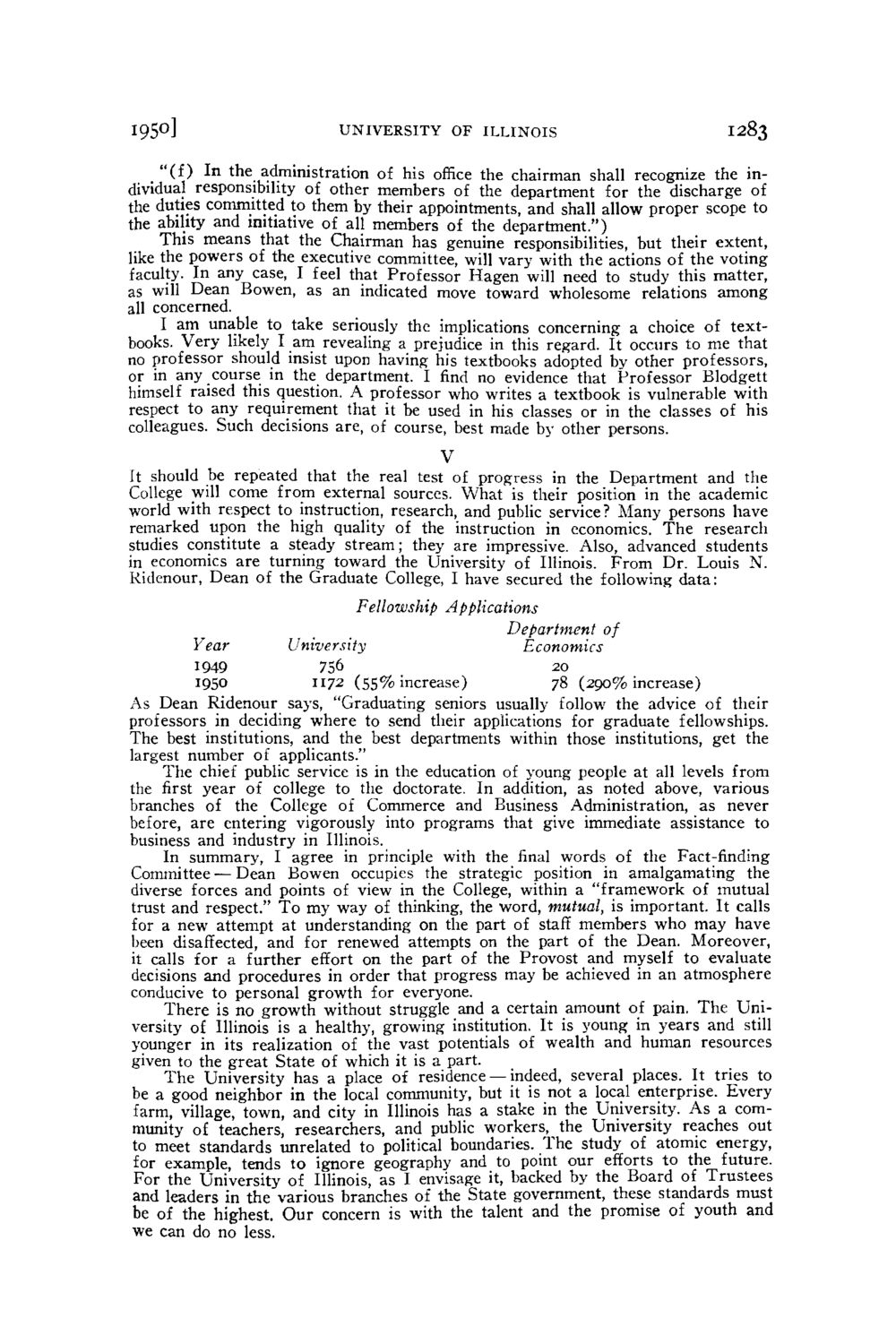| |
| |
Caption: Board of Trustees Minutes - 1950
This is a reduced-resolution page image for fast online browsing.

EXTRACTED TEXT FROM PAGE:
195°] UNIVERSITY OF I L L I N O I S 1283 " ( f ) In the administration of his office the chairman shall recognize the individual responsibility of other members of the department for the discharge of the duties committed to them by their appointments, and shall allow proper scope to the ability and initiative of all members of the department.") This means that the Chairman has genuine responsibilities, but their extent, like the powers of the executive committee, will vary with the actions of the voting faculty. In any case, I feel that Professor Hagen will need to study this matter, as will Dean Bowen, as an indicated move toward wholesome relations among all concerned. I am unable to take seriously the implications concerning a choice of textbooks. Very likely I am revealing a prejudice in this regard. It occurs to me that no professor should insist upon having his textbooks adopted by other professors, or in any course in the department. I find no evidence that Professor Blodgett himself raised this question. A professor who writes a textbook is vulnerable with respect to any requirement that it be used in his classes or in the classes of his colleagues. Such decisions are, of course, best made by other persons. V It should be repeated that the real test of progress in the Department and the College will come from external sources. What is their position in the academic world with respect to instruction, research, and public service? Many persons have remarked upon the high quality of the instruction in economics. The research studies constitute a steady stream; they are impressive. Also, advanced students in economics are turning toward the University of Illinois. From Dr. Louis N. Kidenour, Dean of the Graduate College, I have secured the following data: Applications Department of Year University Economics 1949 75° 20 1950 1172 (55% increase) 78 (290% increase) As Dean Ridenour says, "Graduating seniors usually follow the advice of their professors in deciding where to send their applications for graduate fellowships. The best institutions, and the best departments within those institutions, get the largest number of applicants." The chief public service is in the education of young people at all levels from the first year of college to the doctorate. In addition, as noted above, various branches of the College of Commerce and Business Administration, as never before, are entering vigorously into programs that give immediate assistance to business and industry in Illinois. In summary, I agree in principle with the final words of the Fact-finding Committee •— Dean Bowen occupies the strategic position in amalgamating the diverse forces and points of view in the College, within a "framework of mutual trust and respect." To my way of thinking, the word, mutual, is important. It calls for a new attempt at understanding on the part of staff members who may have been disaffected, and for renewed attempts on the part of the Dean. Moreover, it calls for a further effort on the part of the Provost and myself to evaluate decisions and procedures in order that progress may be achieved in an atmosphere conducive to personal growth for everyone. There is no growth without struggle and a certain amount of pain. The University of Illinois is a healthy, growing institution. It is young in years and still younger in its realization of the vast potentials of wealth and human resources given to the great State of which it is a part. The University has a place of residence — indeed, several places. It tries to be a good neighbor in the local community, but it is not a local enterprise. Every farm, village, town, and city in Illinois has a stake in the University. As a community of teachers, researchers, and public workers, the University reaches out to meet standards unrelated to political boundaries. The study of atomic energy, for example, tends to ignore geography and to point our efforts to the future. For the University of Illinois, as I envisage it, backed by the Board of Trustees and leaders in the various branches of the State government, these standards must be of the highest. Our concern is with the talent and the promise of youth and we can do no less. Fellowship
| |